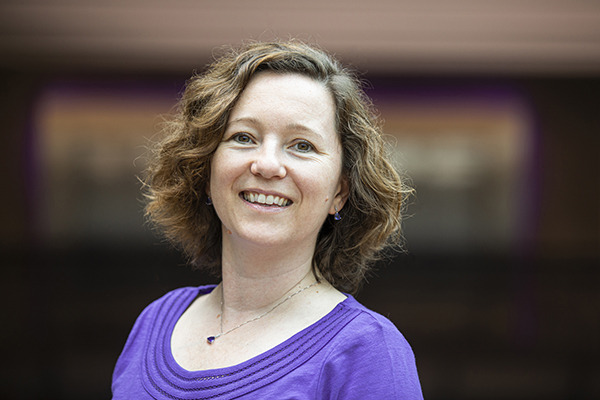The University of Washington today announced the appointment of Magdalena Balazinska as the next director of the Paul G. Allen School of Computer Science & Engineering. Former Dean of Engineering Michael Bragg and UW Provost Mark Richards selected Balazinska, a professor who co-leads the Allen School’s Database and Data Science research groups, to succeed current director Hank Levy, who has overseen 13 years of growth in the school’s size, stature, and impact.
“I am thrilled and deeply honored to work with students, faculty, staff and community stakeholders to advance computer science education and innovation,” Balazinska said in a UW News release. “Together, we have the opportunity to work on the most challenging problems of our time and develop groundbreaking new technology. I look forward to contributing to this goal as the new Allen School Director.”
For the past two years, Balazinska has served as director of the UW eScience Institute and, more recently, as the UW’s First Associate Vice Provost for Data Science. In that dual role, she has developed broad cross-campus partnerships to advance data-intensive discovery across a variety of disciplines and spearheaded the establishment of educational programs for students in the burgeoning field of data science. As Principal Investigator on a major IGERT grant from the National Science Foundation, Balazinska led the creation of the Data Science and Advanced Data Science Ph.D. options at UW, and later co-led the creation of the Undergraduate Data Science option. More than a dozen departments or schools on campus offer students a chance to combine their primary field of study with one or more data science options, from astronomy and oceanography, to genome sciences and psychology. Additional units are preparing to roll out the program in the future, opening up opportunities to students in a widening variety of fields to combine their major with the latest data science methods and tools.
“Magda has been an inspired and energetic leader of campus-wide data science education, research, and adoption,” said professor Ed Lazowska, Bill & Melinda Gates Chair in the Allen School. “She succeeded me as director of UW’s eScience Institute; she became UW’s first-ever Associate Vice Provost for Data Science; she served as Principal Investigator of the nation’s first NSF grant to develop a graduate data science curriculum; and she played an integral role in designing and implementing UW’s undergraduate data science curriculum. She really understands how to partner.”
Balazinska joined the Allen School faculty in 2006, the same year she completed her Ph.D. at MIT. A co-leader of the Database and Data Science groups and an affiliate faculty member in the UW Reality Lab, Balazinska’s primary research focus is in the field of database management systems. Her current research spans data management for data science, big data systems, cloud computing, and image and video analytics. With regard to the latter, Balazinska has recently turned her attention to the development of data management techniques for augmented and virtual reality systems because, as she put it, “Why should the computer graphics and vision people have all the fun?”
Balazinska has made multiple, enduring contributions to the field during her career. For example, her work on novel techniques for increasing fault tolerance in distributed stream processing — at the time, an emerging class of data-intensive applications deployed in an increasing number of domains that included computer networking, financial services, medical information systems, and the military — earned a Test of Time Award in 2017 from the Association for Computing Machinery’s Special Interest Group on the Management of Data (ACM SIGMOD). She also received a 10-Year Most Influential Paper Award from the Working Conference on Reverse Engineering (WCRE) in 2010 for her work on advanced clone analysis for automatically refactoring software code. In addition, Balazinska’s body of work in scalable distributed data systems inspired the Very Large Data Bases (VLDB) conference — the flagship international conference on database research — to honor her with the inaugural Women in Database Research Award. In addition to her own research, Balazinska has also contributed to efforts to build up the regional database research community, co-founding the Northwest Database Society (NWDS) to bring together scholars and practitioners focused on databases and database management systems in the Pacific Northwest.
“Magda brings to this new leadership position not just a wealth of experience, but the type of vision and ability to work with people that will help keep the University of Washington and our entire tech community on a successful path,” Microsoft President Brad Smith told GeekWire.
Previously, Balazinska received an NSF CAREER Award, which supports the most promising early-career scientists and engineers. She is also a past recipient of a Microsoft Research New Faculty Fellowship; an HP Labs Innovation Research Award; two Google Faculty Research Awards; and multiple best paper awards. Before enrolling in MIT’s graduate program in Computer Science, her bachelor’s and master’s degrees in Computer Engineering and Electrical Engineering, respectively, from the Ecole Polytechnique de Montréal.
“I feel really good about how far we have come as a school and the direction we are headed for the future. We have an outstanding organization and culture with tremendous potential,” said Levy, who holds the Wissner-Slivka Chair in the Allen School. “Magda is an accomplished leader, gifted researcher, and forward-thinking educator who understands how computing can have a significant, positive impact on the university and on society. I am excited to see the school thrive with Magda at the helm.”
Balazinska will assume her new role effective January 1, 2020, subject to approval by the UW Board of Regents. Read the UW News release here, and a related story in GeekWire here.
Congratulations, Magda!


